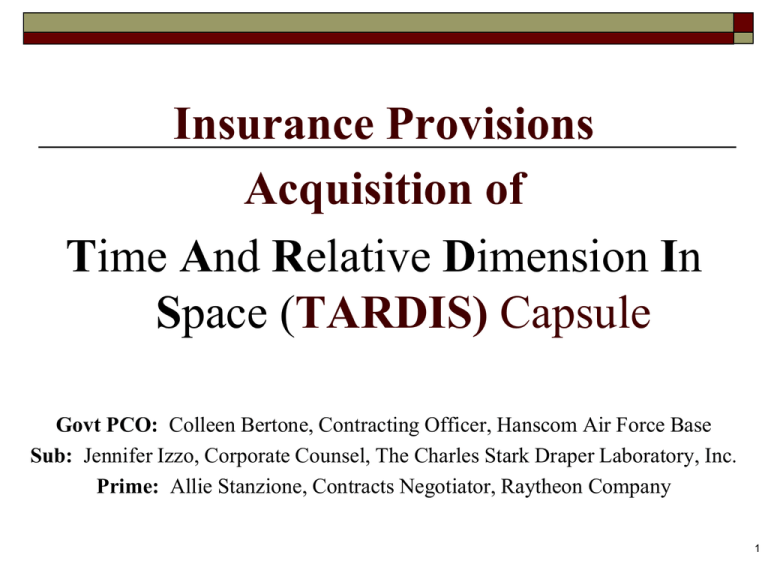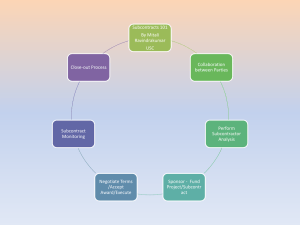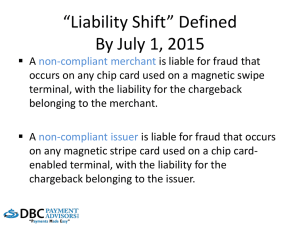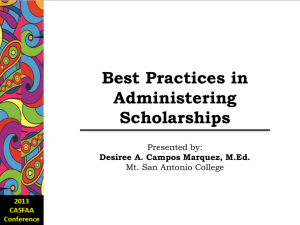Session 3 - Course 18 - Insurance Provisions
advertisement

Insurance Provisions Acquisition of Time And Relative Dimension In Space (TARDIS) Capsule Govt PCO: Colleen Bertone, Contracting Officer, Hanscom Air Force Base Sub: Jennifer Izzo, Corporate Counsel, The Charles Stark Draper Laboratory, Inc. Prime: Allie Stanzione, Contracts Negotiator, Raytheon Company 1 Agenda Types of Insurance Typical Insurance Requirements in Government Prime and Subcontracts How Insurance Clauses Work With Indemnification Clauses Disputes Clause 2 Types of Insurance Comprehensive General Liability Insurance & Umbrella Liability Comprehensive Automobile Liability Workmen’s Compensation/Employer’s Liability Insurance Overseas Workers Compensation and War Hazard Insurance Aircraft Public and Passenger Liability Insurance Vessel Liability Insurance Cargo Insurance Work on the Government Installation Insurance Against Loss of or Damage to Government Property 3 Setting the Scene…… The TARDIS Time And Relative Dimension In Space Space-time vehicle Flies through space and time by de- and re-materializing 4 Setting the Scene…… 5 Setting the Scene…… 6 General Liability Insurance & Umbrella Liability Coverage Covers bodily injury and/or property damage to third parties caused by acts or omissions of the insured party FAR § 28.307-2 requires bodily injury liability insurance in the minimum amount of $500,000 per occurrence 7 The Prime’s General Liability Clause The Contractor shall effect and maintain the following insurance: Commercial general liability, including personal injury and if applicable, product liability/completed operations coverage, in the minimum amount of $2,000,000 personal injury, $2,000,000 per occurrence, $2,000,000 general aggregate, and $2,000,000 product/completed operations aggregate; and Umbrella Liability having limits of $300,000,000 aggregate. 8 Additional Insured Clause “All insurance required herein shall be endorsed to include the PRIME, its officers and employees as additional insured and shall not be reduced or canceled without 30 days prior written notice to the PRIME.” 9 Waiver of Subrogation Clause “Company A waives all rights against the Company B for damages caused by any peril to the extent covered by insurance provided under the insurance requirements of this Agreement. Company A shall require similar waivers by Subcontractors. All insurance policies required hereunder shall permit and recognize such waivers of subrogation.” 10 Comprehensive Automobile Liability Comprehensive Automobile Liability covers bodily injury and/or property damage to third parties due to act or omission committed by a company or its employees arising from the use of company owned or non-owned vehicles. FAR § 52.228-10 / 28.307-2(c) requires injury and property damage liability covering the operation of all automobiles used in performance of the contract. The minimum limits are $200,000 per person and $500,000 per occurrence for bodily injury and $20,000 per occurrence for property damage. 11 The Prime’s Auto Liability Clause “The subcontractor must carry automobile liability coverage for owned, hired and non-owned vehicles in the minimum amount of $400,000,000 per occurrence combined single limit.” 12 Workmen’s Compensation / Employer’s Liability Insurance Covers medical expenses and lost wages for employee injuries arising out of the course and scope of employment. FAR § 52.228-3 / § 28.307(a): Must carry employer’s liability for accidental bodily injury or death and occupational disease with a minimum liability limit of $100,000. 13 Prime’s Worker’s Compensation Clause “Subcontractor must carry a policy of Worker’s Compensation that meets the statutory obligations imposed by law in the state in which the work under this agreement is to be performed.” 14 Work on the Government Installation Covers contractor’s or subcontractor’s work at a Government facility/installation. FAR §52.228-5: Contractor and subcontractor working at a government installation must provide and maintain the minimum insurance requirements listed in the FAR for worker’s comp, employer’s liability, commercial general liability and automobile liability. 15 Overseas Workers Compensation and War Hazard Insurance Covers employees working or traveling overseas or in war zone areas. FAR § 52-228-3 and § 52-228-4, and § 28.305 16 Insurance Against Loss of or Damage to Government Property Covers damage to government property (except to the extent covered by contractor’s insurance policy). FAR § 52.228 / § 52.246-25 17 Aircraft Public and Passenger Liability Insurance Covers contractors if an aircraft is used in connection with performance of the contract. FAR § 28.307-2(d) requires coverage of at least $200,000 per person and $500,000 per occurrence for bodily injury, other than passenger liability, and $200,000 per occurrence for property damage. Coverage for passenger liability bodily injury shall be at least $200,000 multiplied by the number of seats or passengers, whichever is greater. 18 Vessel Liability Insurance Required when contract performance involves use of vessels. FAR § 28.307-2(e) does not prescribe amounts for vessel collision liability, as these values are determined by the agency based on the contract size, value, type of work performed. 19 Cargo Insurance Covers cargo in the care, custody, or control of the carrier. Risks covered are the non-delivery, including theft, loss of shipment due to a collision, explosion or burning the transportation provider, damages due to the bad weather, flood, mud and grease. FAR § 52.228-9 requires the total value of the property in the shipment be insured. 20 Insurance and Indemnification Indemnification is a promise by one party to take financial responsibility for damages that the other party may suffer in the future. 21 Prime’s Indemnification Clause “To the fullest extent permitted by law, CONTRACTOR shall indemnify and hold harmless OWNER and its directors, agents and employees from and against all claims, damages, losses, and expenses including but not limited to attorneys’ fees arising out of or resulting from the performance of the work by the CONTRACTOR or its subcontractors, regardless of whether or not it is caused in part by a party indemnified hereunder.” 22 Sub’s edits to Indemnity Clause To the fullest extent permitted by law, CONTRACTOR shall indemnify and hold harmless BUYER and its directors, agents and employees from and against all claims, damages, losses, and expenses including but not limited to attorneys’ fees arising out of or resulting from the grossly negligent acts or omissions or willful misconduct of performance of the work by the CONTRACTOR or its subcontractors, except to the extent such claims arise directly out of the negligence or willful misconduct of the BUYER. regardless of whether or not it is caused in part by a party indemnified hereunder. In no event shall CONTRACTOR’s liability arising out of or in connection with this Agreement exceed, in the aggregate, the total fees paid by OWNER hereunder. IN NO EVENT SHALL EITHER PARTY BE LIABLE TO THE OTHER PARTY FOR ANY SPECIAL, EXEMPLARY, INCIDENTAL, CONSEQUENTIAL, PUNITIVE OR OTHER INDIRECT DAMAGES OF ANY KIND, EVEN IF SUCH PARTY HAS BEEN ADVISED IN ADVANCE OF THE POSSIBILITY OF SUCH DAMAGES, OR SUCH DAMAGES COULD HAVE REASONABLY FORESEEN BY SUCH PARTY. 23 FAR 52.228-7 Insurance Liability to Third Parties Cost reimbursement contracts If Contractor maintains required insurance, then Government will reimburse Contractor for liabilities to third persons not compensated by insurance. Doesn’t matter if contractor negligent But…. Government will only reimburse final judgments or settlements Subject to availability of appropriated funds Excluded: willful misconduct or failure to carry required insurance 24 Flowing Down FAR 52.228-7 to Sub Cannot flow down without government’s consent If flowed down without government’s consent, effect is that prime is indemnifying sub One potential solution is to amend Disputes clause to state that prime will sponsor sub’s claims to the government 25 Language for Disputes Clause “Any dispute that arise this Subcontract which relates to a matter that gives the Prime Contractor recourse against the Government under the prime contract or applicable law, shall, at Prime’s election, be resolved as follows … Prime shall promptly notify Subcontractor of any decision by the Contracting Officer on such claim. If said decision is binding upon Prime under the prime contract or applicable law, it shall in turn be binding upon Prime and Subcontractor with respect to such decision insofar as it relates to this Subcontract. If Subcontractor is adversely affected by any such decision made by the Contracting Officer, and if Prime elects not to appeal such decision pursuant to the “Disputes” clause of the prime contract and applicable law, Prime shall promptly notify Subcontractor. If Subcontractor thereafter timely requests Prime to appeal such decision, Prime shall authorize Subcontractor to do so under the name of Prime as the sponsor of Subcontractor’s appeal. Any decision upon such an appeal, whether submitted by Prime or Subcontractor with Prime’s sponsorship, if binding upon Prime under the prime contractor applicable law, shall in turn be binding upon Prime and Subcontractor under this Subcontract with respect to such decision insofar as it relates to this Subcontract.” 26 Questions?








